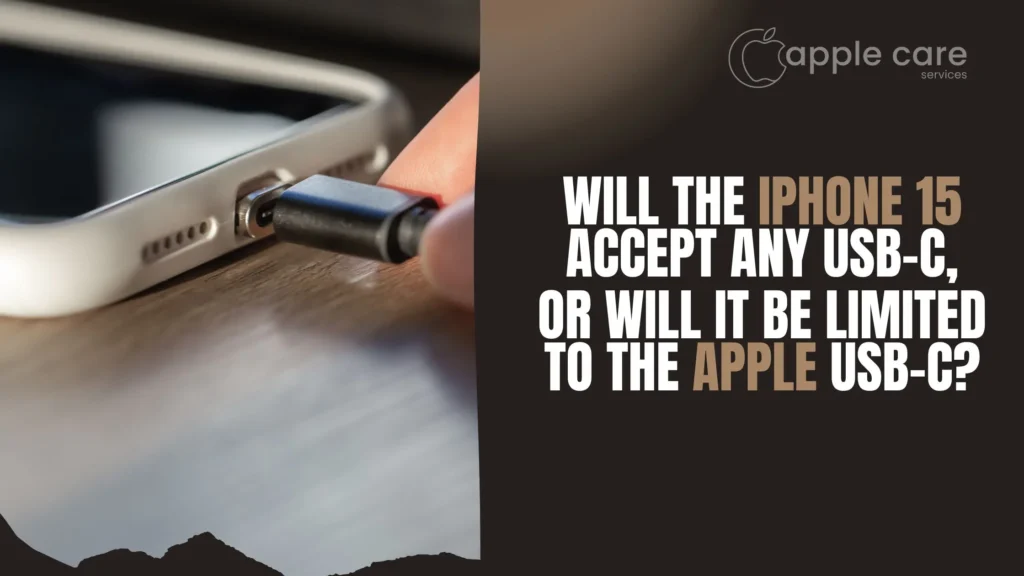
Will iPhone 15 Accept Any USB-C or Be Limited to Apple USB-C?
The aspect that users have always eagerly waited for about the new iPhone 15 series is the change of the Lightning port to USB-C. This industry-standard port should enable consumers with iPhones to finally use any third-party USB-C cable to charge and access their devices. However, this may not be the case if the experience Apple has always had with the regulation of the compatibility of accessories is anything to go by.
Chances of Broad USB-C Compatibility
First, USB-C is an industry standard that should technically enable any USB-C-compliant cable to be used for interacting with the iPhone 15. This would free iPhone users from the seemingly monotonous experience of having to solely use Apple’s expensive cables. This is something many are keenly waiting for in the hope that they will be able to switch to cheaper and more efficient third-party suppliers.
However, it has been rather unusual to see Apple support a USB-C standard in such a non-specific manner. This is true because, since the first iPhone, Apple has kept a vertical grip on its environment. For instance, Android phones can be charged with any type of micro-USB or USB-C cable, while iPhones and iPads have been in sync with Apple’s certified lightning cable.
USB Restricted Mode and Other Limitations
Apple may integrate the so-called “USB Restricted Mode” into the iPhone 15 to prevent third-party cable access for data transfer for some reason. While some give users basic charging capabilities, crucial data transfers or specific accessories may require the use of genuine USB-C cables from Apple.
There could be other constraints as well. For instance, Apple’s chargers will be faster than third-party products because the former come with unique power regulations. Peripherals that use USB-C interfaces for audio or video inputs may have reduced functionality when not using Apple-compliant cables.
Additional Performance Bottlenecks
It is obvious that, even if data transfers are allowed at full USB 3.0 speeds recognized, other barriers might be present with third-party USB C cables that may not have been designed for iPhones. Charging and power control may be faster and more efficient when using Apple-manufactured cables, especially USB-C to USB-C cables, as opposed to third-party non-Apple compatible cables.
Even when purchasing third-party cables, lower quality or improper shielding could result in signal interference problems that result in audio noise or video artefacts or affect wireless usage when used for charging with other processes. It may limit support for potential future feature enhancements, such as external GPUs, or be incompatible with them at all.
Potential Regulatory Roadblocks
Certain global regions and government institutions are promoting the regulation of consumer electronics such as iPad, where third-party accessory compatibility standards should be fully supported when based on open interfaces like the USB-C. The European Union and Brazil are countries, which have the requirements in progress.
If Apple is forced by the limits of legal actions to accept the unrestricted compatibility with non-proprietary cable and accessory, including USB-C in those markets, it’s likely the company will be pressured to open up rather than have an absolutely fragmented environment.
So indeed, upcoming iPhones could get USB-C charging – as everything else has moved to the standard – and in the process enable such benefits as open accessory support. That said, given Apple’s propensity for monetizing its proprietary accessories, there will likely be some limitations for non-certified third-party USB-C accessories if the iPhone 15 utilises the connector. Your mileage may vary, but general full data transfer rates, rapid charging, and the most high-end accessories are going to need some of those premium, certified cables and dongles. Apple has little incentive to fully open unless forced by regulation or market pressure – its money comes from high-margin, proprietary accessories.
Nonetheless, AppleCare continues to be one of Apple’s strong suits, and Apple customer support could use a similar expansion of their overseas operations. Apple Care – Apple service centre in Doha, Qatar has all the expertise in the world to support all types of Apple products. The specialist technicians at the Service Centre follow the strict uncompromising servicing guidelines set by Apple to deliver a genuine part repair to your damaged goods; from consumer guidance on USB-C expansion accessory compatibility. That density of local support will make it an even more attractive choice for Apple ecosystem users in Doha, even if it ends up restricting accessories.

|Hello to all, for the reason that I am actually keen of